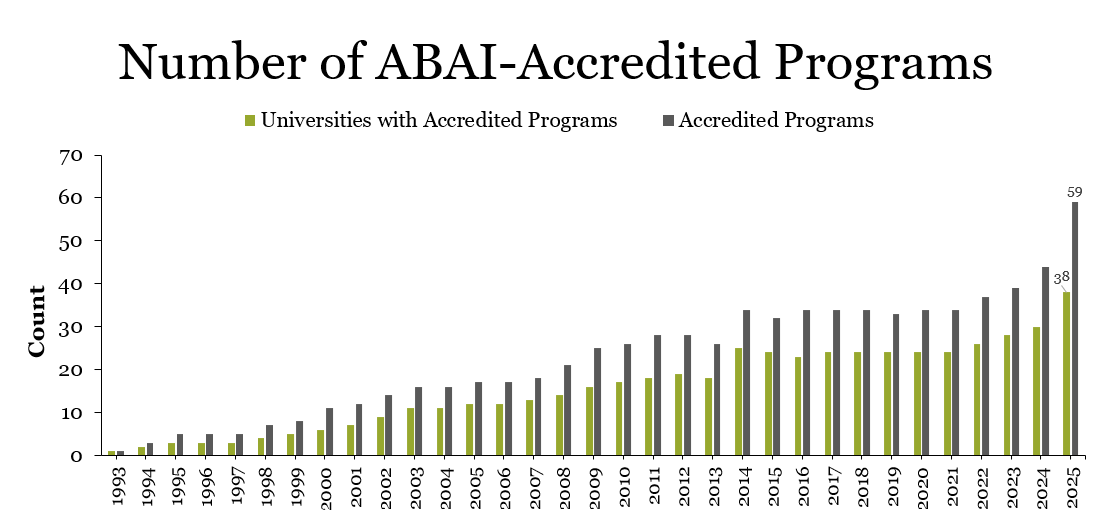About the Association for Behavior Analysis International Accreditation Board
The Association for Behavior Analysis International (ABAI) Accreditation Board is the governance body responsible for the accreditation of training programs in behavior analysis at the bachelor’s, master’s, and doctoral levels. The Accreditation Board operates as a board of the Association for Behavior Analysis International (ABAI) and carries out its responsibilities in a manner consistent with the ABAI bylaws and articles of incorporation.
The Board is responsible for developing, reviewing, and updating accreditation standards and policies and managing the accreditation process, which includes selecting and training volunteer program reviewers; providing consultative guidance to accredited and applicant programs; managing application processes, site visits, and processes for complaints and appeals; and communicating information about accreditation to students and the public. As an autonomous board of ABAI, the Accreditation Board has sole responsibility for decisions regarding the accreditation of behavior analysis programs and the final authority to approve policies and procedures for the implementation of the standards of accreditation with input from communities of interest, including accredited programs, professional organizations, students, faculty, and the public.
Mission
The mission of the Board is to accredit excemplary educational programs that train behavior scientists and scientist-practitioners in the experimental and theoretical foundations of behavior analysis and ethical conduct in research, teaching, and evidence-based practice. The Board accomplishes this through a process designed to encourage and support excellent programs, and to promote continuous improvement of those programs.
History
ABAI’s accreditation system has an extensive, decades-long history, with the mission above being exemplified over the years. Below we summarize the evolution of ABAI’s accreditation system to where it stands today, stronger than ever.
- 1977: ABAI develops an Education and Evaluation Committee
- 1988: ABAI Executive Council created a task force to work on the possible accreditation of graduate programs in behavior analysis.
- 1991: The task force developed a set of minimum standards for accreditation at both the master’s and doctoral levels.
- 1993: ABAI accredited its first program – the master’s program at the University of North Texas!
- 2009: ABAI developed standards and began accrediting programs at the undergraduate level and revised the requirements for graduate-level training programs.
- 2015: With CHEA recognition in mind, an autonomous Accreditation Board was formally established. Additionally, the accreditation standards (2015) were formalized and approved.
- 2021: The ABAI Accreditation Board is awarded initial recognition by CHEA for a term of 7 years for the following scope of accreditation: The Accreditation Board of the Association for Behavior Analysis International accredits degree programs in behavior analysis at the master's and doctoral levels in institutions of higher learning in the United States of America. See further details on ABAI’s CHEA recognition below.

As of January 2026
CHEA Recognition
The ABAI Accreditation Board is recognized by the Council for Higher Education Accreditation (CHEA). CHEA is a nonprofit, nongovernmental institutional membership organization that “recognizes” accrediting organizations or periodically reviews their effectiveness in assuring and improving quality in higher education. The purpose of CHEA recognition is to provide assurance to the public that accrediting organizations are competent to engage in quality review of institutions and programs based on the standards that CHEA has developed, which are presented in the CHEA Recognition Policy and Procedures.
Click here to learn more about our recognition.
Diversity, Equity, and Inclusion
The ABAI Accreditation Board supports the ABAI Diversity Policy: The Association for Behavior Analysis International encourages diversity, equity, and inclusion in the field of behavior analysis broadly, and within the organization specifically. Diversity refers to differences in race, ethnicity, sexual orientation, gender identity, age, country of origin, religious or spiritual beliefs, ability, and socioeconomic class. It is expected that all ABAI members as well as non-members who participate in ABAI events treat one another with respect. The diversity policy was approved by the Executive Council in 2019.
Furthermore, the ABAI Accreditation Board's Accreditation Standard 7-106 states: The program abides by institutional policies with respect to diversity and nondiscrimination of ethnicity, gender, disability, and veteran status. The program must provide copies of institutional policies related to diversity and nondiscrimination, and certify that the program's faculty and students act in accord with these policies.
Board Members
Voting Members
Catia Cividini-Motta (University of South Florida): 2023-2027

Catia Cividini-Motta, Ph.D., is an Assistant Professor and the Associate Director of the ABA Program in the Department of Child & Family Services within the College of Behavior & Community Services at the University of South Florida. She received her doctorate in Behavior Analysis from Western New England University and holds a master’s degree in Applied Behavior Analysis from Northeastern University. Her research interests include assessment and treatment of problem behavior, particularly automatically reinforced problem behavior; skill acquisition, focusing on verbal behavior; and the implementation of contextually-fit behavioral assessment and interventions within school settings. Catia serves on the editorial board of two behavior analytic journals, Behavioral Interventions and The Analysis of Verbal Behavior.
Linda Fulton (Private Consultant, Laboratory Animal Medicine): 2024-2026
 Linda K. Fulton, MS, DVM, is currently a Private Consultant in the field of Laboratory Animal Medicine. She has served as Assistant Director, Laboratory Animal Facilities, at the University of Mississippi Medical Center (UMMCF) in Jackson, Mississippi. While there she was an Assistant Professor in the Biomaterials Department. Prior to her position at UMMC, she held the positions of on-site veterinarian at St. Kitts Biomedical Research Foundation, Clemson University’s Associate Veterinarian, and faculty member in the Clemson’s Department of Animal and Veterinary Sciences. She served as the President of the Southeastern Branch of the American Association of Laboratory Animal Science and 13 years as a member for the AAALAC, International Council on Accreditation, serving as President in 2023. She is currently an ad hoc and Emeritus member for AAALAC, International. She received her doctorate in veterinary medicine from Mississippi State University. Her interests in laboratory animal medicine focus on refinement of techniques for animal housing and handling and the experiences of commission fatigue in laboratory animal care staff.
Linda K. Fulton, MS, DVM, is currently a Private Consultant in the field of Laboratory Animal Medicine. She has served as Assistant Director, Laboratory Animal Facilities, at the University of Mississippi Medical Center (UMMCF) in Jackson, Mississippi. While there she was an Assistant Professor in the Biomaterials Department. Prior to her position at UMMC, she held the positions of on-site veterinarian at St. Kitts Biomedical Research Foundation, Clemson University’s Associate Veterinarian, and faculty member in the Clemson’s Department of Animal and Veterinary Sciences. She served as the President of the Southeastern Branch of the American Association of Laboratory Animal Science and 13 years as a member for the AAALAC, International Council on Accreditation, serving as President in 2023. She is currently an ad hoc and Emeritus member for AAALAC, International. She received her doctorate in veterinary medicine from Mississippi State University. Her interests in laboratory animal medicine focus on refinement of techniques for animal housing and handling and the experiences of commission fatigue in laboratory animal care staff.
Eric Jacobs (Southern Illinois University): 2024-2026
 Eric A. Jacobs, Ph.D., is an Associate Professor in Southern Illinois University’s School of Psychological and Behavioral Sciences, where he is affiliated with the Behavior Analysis and Therapy and Brain and Cognitive Sciences programs. Dr. Jacobs completed graduate training at the University of Florida and completed a post-doctoral fellowship at the University of Vermont. Dr. Jacobs has served as the president of the Southeastern Association for Behavior Analysis and Division 25 (Behavior Analysis) of the American Psychological Association. His research interests include human and nonhuman operant behavior, quantitative analyses of choice and decision-making (e.g., delay discounting, "self-control", & "impulsivity"), behavioral economics, and behavioral ecology.
Eric A. Jacobs, Ph.D., is an Associate Professor in Southern Illinois University’s School of Psychological and Behavioral Sciences, where he is affiliated with the Behavior Analysis and Therapy and Brain and Cognitive Sciences programs. Dr. Jacobs completed graduate training at the University of Florida and completed a post-doctoral fellowship at the University of Vermont. Dr. Jacobs has served as the president of the Southeastern Association for Behavior Analysis and Division 25 (Behavior Analysis) of the American Psychological Association. His research interests include human and nonhuman operant behavior, quantitative analyses of choice and decision-making (e.g., delay discounting, "self-control", & "impulsivity"), behavioral economics, and behavioral ecology.
Kathryn Kestner (West Virginia University): 2026-2028
 Katie Kestner, PhD, is an assistant professor and Coordinator of the Behavior Analysis Program in the Department of Psychology at West Virginia University. She earned her PhD from Western Michigan University in 2015. Dr. Kestner's research focuses on translational approaches in behavior analysis, with particular emphasis on behavioral relapse and the role of complex schedules and choice in behavioral interventions. Her work bridges laboratory research with applied contexts to inform strategies for preventing relapse and promoting durable behavior change. She has served as an associate editor for Education and Treatment of Children and as an editorial board member for several pee-reviewed journals, including the Journal of the Experimental Analysis of Behavior, Perspectives on Behavior Science, and Behavior Analysis in Practice.
Katie Kestner, PhD, is an assistant professor and Coordinator of the Behavior Analysis Program in the Department of Psychology at West Virginia University. She earned her PhD from Western Michigan University in 2015. Dr. Kestner's research focuses on translational approaches in behavior analysis, with particular emphasis on behavioral relapse and the role of complex schedules and choice in behavioral interventions. Her work bridges laboratory research with applied contexts to inform strategies for preventing relapse and promoting durable behavior change. She has served as an associate editor for Education and Treatment of Children and as an editorial board member for several pee-reviewed journals, including the Journal of the Experimental Analysis of Behavior, Perspectives on Behavior Science, and Behavior Analysis in Practice.
Cynthia Pietras (Western Michigan University): 2023-2028
 Dr. Cynthia Pietras is a Professor of Psychology at Western Michigan University. She received her graduate degrees in the Experimental Analysis of Behavior at the University of Florida and completed her postdoctoral training in Human Psychopharmacology at the University of Texas Health Science Center-Houston. She has served on the editorial board multiple behavior-analysis journals, including associate Editor roles. She has served as a member of the ABAI Science Board, executive committee of SQAB, president of the Mid-American Association for Behavior Analysis, and as past program chair of the WMU Behavior Analysis graduate program. Her research focuses on basic behavior processes, including choice, punishment and avoidance, and social behavior, behavior economics, and more recently on climate-change relevant decision making. She has conceptual interests in verbal behavior and radical behaviorism.
Dr. Cynthia Pietras is a Professor of Psychology at Western Michigan University. She received her graduate degrees in the Experimental Analysis of Behavior at the University of Florida and completed her postdoctoral training in Human Psychopharmacology at the University of Texas Health Science Center-Houston. She has served on the editorial board multiple behavior-analysis journals, including associate Editor roles. She has served as a member of the ABAI Science Board, executive committee of SQAB, president of the Mid-American Association for Behavior Analysis, and as past program chair of the WMU Behavior Analysis graduate program. Her research focuses on basic behavior processes, including choice, punishment and avoidance, and social behavior, behavior economics, and more recently on climate-change relevant decision making. She has conceptual interests in verbal behavior and radical behaviorism.
Raymond Pitts (University of North Carolina Wilmington): 2023-2027

Raymond C. Pitts is a Professor of Psychology at the University of North Carolina Wilmington (UNCW). He received his Ph.D. in Psychology from the University of Florida in 1989, with a specialty in the Experimental Analysis of Behavior. After completing a post-doctoral fellowship in the Department of Physiology and Pharmacology at the Wake Forest Medical School, he took a job as a Research Assistant Professor in the Department of Psychology at the University of North Carolina Chapel Hill. In 1996, he moved to the Department of Psychology at the UNCW, and has been there ever since. He has mentored several graduate and undergraduate students within the Behavior Analysis program at UNCW. He has served on several Editorial Boards, and as an Associate Editor for the Journal of the Experimental Analysis of Behavior. His research interests include basic experimental analyses of choice/preference and behavioral mechanisms of drug action. His work has been supported by grants from the NIH (NIDA), and has been published in journals such as Journal of the Experimental Analysis of Behavior, Behavioural Processes, Journal of Pharmacology and Experimental Therapeutics, Psychopharmacology, Behavioural Pharmacology, Behavioral Neuroscience, and Clinical and Experimental Psychopharmacology. He served as the Experimental Representative for the Executive Council of Division 25 of APA, served as the Experimental Representative on the Executive Council of the Association for Behavior Analysis International, and is a Fellow of ABAI and of APA Division 25.
Ingunn Sandaker (Oslo Metropolitan University): 2026-2028

Ingunn Sandaker, professor in the Department of Behavioral Science at Oslo Metropolitan University (OsloMet) in Norway, received her Ph.D. in organizational psychology from the University of Oslo in 1997. She has served in numerous roles, including as dean of studies for social work and special education at Oslo College. She was project manager at OsloMet and instrumental in establishing its master’s and Ph.D. programs in behavior analysis; she has since been director of those programs until 2022. Combining expertise in both behavior analysis and systems design/analysis (behavior systems), she served as a consultant and advisor to major corporations, including Norway’s huge oil sector and the Norwegian Olympic Committee, where, as leadership training project director, she played a significant role in enhancing participation and awards for women athletes. Her efforts have helped secure behavior analysis as an established discipline in Norway. In addition, Professor Sandaker has been a leader in international dissemination, serving as the international representative to ABAI’s Executive Council. She is also on the editorial board of the Norwegian Journal of Behavior Analysis and has served as associate editor of Perspectives on Behavior Science. She is an ABAI Fellow and received in 2023 the SABA Award for Enduring Programmatic Contribution to Behavior Analysis.
Dean Williams (University of Kansas): 2026-2028
 Dean Williams, Senior Scientist Emeritus at the Schiefelbusch Institute for Life Span Studies at the University of Kansas, received his Ph.D. from the University of Florida in 1989. His work is a model of bi-directional translational research in which his parallel animal and human studies have contributed to the design of treatment programs for clinical populations as well as to the analysis of basic principles of behavior. For more than 25 years, Dr. Williams’ research has been continuously funded by the NIH for his innovative research in stimulus control, behavioral pharmacology, schedule change-over effects, and issues of broad interest in the behavioral, social, and biological sciences. His creative synthesis and integrative approach to research have built connections between behavior analysis and a number of scientific disciplines. Through his publications in a wide array of leading journals and numerous conference presentations, Dr. Williams has made his work visible to a broad community and served as an effective ambassador for behavior analysis.
Dean Williams, Senior Scientist Emeritus at the Schiefelbusch Institute for Life Span Studies at the University of Kansas, received his Ph.D. from the University of Florida in 1989. His work is a model of bi-directional translational research in which his parallel animal and human studies have contributed to the design of treatment programs for clinical populations as well as to the analysis of basic principles of behavior. For more than 25 years, Dr. Williams’ research has been continuously funded by the NIH for his innovative research in stimulus control, behavioral pharmacology, schedule change-over effects, and issues of broad interest in the behavioral, social, and biological sciences. His creative synthesis and integrative approach to research have built connections between behavior analysis and a number of scientific disciplines. Through his publications in a wide array of leading journals and numerous conference presentations, Dr. Williams has made his work visible to a broad community and served as an effective ambassador for behavior analysis.
Benjamin Witts, Coordinator of the Board (St. Cloud State University): 2022-2026
 Benjamin Witts earned his BA (psychology) at Winona State University, his MA (clinical psychology) at Mankato State University, and his PhD (behavior analysis) at the University of Nevada, Reno. Currently, he is an associate professor at St. Cloud State University where he serves as program coordinator for the undergraduate and masters programs in ABA. His scholarly interests center on translational research as it applies to infant-caregiver interactions during intense crying episodes, and is involved in interprofessional research to pursue this work. He is most passionate about his teaching and his students’ success, and his work has been recognized with a Minnesota State Colleges and Universities award for Outstanding Educator and an ABAI Outstanding Mentor award. Most of his academic work is focused on engineering efficient low-cost accessible educational materials that fit the needs of modern students.
Benjamin Witts earned his BA (psychology) at Winona State University, his MA (clinical psychology) at Mankato State University, and his PhD (behavior analysis) at the University of Nevada, Reno. Currently, he is an associate professor at St. Cloud State University where he serves as program coordinator for the undergraduate and masters programs in ABA. His scholarly interests center on translational research as it applies to infant-caregiver interactions during intense crying episodes, and is involved in interprofessional research to pursue this work. He is most passionate about his teaching and his students’ success, and his work has been recognized with a Minnesota State Colleges and Universities award for Outstanding Educator and an ABAI Outstanding Mentor award. Most of his academic work is focused on engineering efficient low-cost accessible educational materials that fit the needs of modern students.
Non-Voting Members
Leonard Green, Council Liaison (Washington University in St. Louis): 2025–2026
 Dr. Leonard Green received his B.A. from City College of CUNY in 1969, and his Ph.D. from SUNY at Stony Brook in 1974. He now is professor of psychology at Washington University in St. Louis. He is best known for his extensive and innovative research in behavioral economics and probability and delay discounting, in which he has published a considerable number of seminal papers in a wide range of journals. He is the author (with John. H. Kagel and Raymond C. Battalio) of Economic Choice Theory: An Experimental Analysis of Animal Behavior and has edited three other books. He was editor of the Journal of the Experimental Analysis of Behavior from 2003 to 2007, and has been associate editor of this journal as well as of the Pavlovian Journal of Biological Science. He has served on a number of editorial boards including those in Behavior and Philosophy and Behaviour Analysis Letters. He is on the Society for the Experimental Analysis of Behavior board of directors, the executive board of the Society for the Quantitative Analyses of Behavior, the board of the Cambridge Center for Behavioral Studies, and the board of directors of Missouri Families for Effective Autism Treatment.
Dr. Leonard Green received his B.A. from City College of CUNY in 1969, and his Ph.D. from SUNY at Stony Brook in 1974. He now is professor of psychology at Washington University in St. Louis. He is best known for his extensive and innovative research in behavioral economics and probability and delay discounting, in which he has published a considerable number of seminal papers in a wide range of journals. He is the author (with John. H. Kagel and Raymond C. Battalio) of Economic Choice Theory: An Experimental Analysis of Animal Behavior and has edited three other books. He was editor of the Journal of the Experimental Analysis of Behavior from 2003 to 2007, and has been associate editor of this journal as well as of the Pavlovian Journal of Biological Science. He has served on a number of editorial boards including those in Behavior and Philosophy and Behaviour Analysis Letters. He is on the Society for the Experimental Analysis of Behavior board of directors, the executive board of the Society for the Quantitative Analyses of Behavior, the board of the Cambridge Center for Behavioral Studies, and the board of directors of Missouri Families for Effective Autism Treatment.
Mark Reilly, Council Liaison (Central Michigan University): 2023–2026
 Dr. Reilly received his B.S. degree in Psychology from the University of Florida, his M.S. degree in Behavior Analysis from the University of North Texas and his Ph.D. in Experimental Psychology from West Virginia University in 1996. He was a Postdoctoral Research Fellow at the University of Michigan Substance Abuse Research Center and an Assistant Professor of Research at Arizona State University. He is currently Professor of Psychology and the Undergraduate Director at Central Michigan University. Dr. Reilly’s professional service includes over 12 years as a member on Central Michigan University’s Institutional Animal Care and Use Committee, a member on the American Psychological Association’s Committee on Animal Research and Ethics. He has been serving on the Board of Directors for the Association for Assessment and Accreditation of Laboratory Animal Care since 2017. Dr. Reilly was President of Division 25 (Behavior Analysis) of the American Psychological Association in 2015. He has had numerous editorial appointments including the Journal of the Experimental Analysis of Behavior, the Psychological Record and the Mexican Journal of Behavior Analysis. He is currently on the Board of Editors for Behavior Analysis: Research and Practice. Dr. Reilly has over 30 years of laboratory research experience and has published over 40 peer-reviewed articles and presented more than 80 papers in national and international meetings. His research focuses primarily on delayed reinforcement and how behavior-consequence relations impact operant behavior broadly. His research incorporates a quantitative, comparative approach to understanding topics such as impulsive choice, stimulus control and environmental enrichment. Dr. Reilly has been a member of the Association for Behavior Analysis International since 1992.
Dr. Reilly received his B.S. degree in Psychology from the University of Florida, his M.S. degree in Behavior Analysis from the University of North Texas and his Ph.D. in Experimental Psychology from West Virginia University in 1996. He was a Postdoctoral Research Fellow at the University of Michigan Substance Abuse Research Center and an Assistant Professor of Research at Arizona State University. He is currently Professor of Psychology and the Undergraduate Director at Central Michigan University. Dr. Reilly’s professional service includes over 12 years as a member on Central Michigan University’s Institutional Animal Care and Use Committee, a member on the American Psychological Association’s Committee on Animal Research and Ethics. He has been serving on the Board of Directors for the Association for Assessment and Accreditation of Laboratory Animal Care since 2017. Dr. Reilly was President of Division 25 (Behavior Analysis) of the American Psychological Association in 2015. He has had numerous editorial appointments including the Journal of the Experimental Analysis of Behavior, the Psychological Record and the Mexican Journal of Behavior Analysis. He is currently on the Board of Editors for Behavior Analysis: Research and Practice. Dr. Reilly has over 30 years of laboratory research experience and has published over 40 peer-reviewed articles and presented more than 80 papers in national and international meetings. His research focuses primarily on delayed reinforcement and how behavior-consequence relations impact operant behavior broadly. His research incorporates a quantitative, comparative approach to understanding topics such as impulsive choice, stimulus control and environmental enrichment. Dr. Reilly has been a member of the Association for Behavior Analysis International since 1992.
ABAI Staff
Michele Williams, ABAI Education Director
 Dr. Michele Williams, BCBA-D, is a graduate of the behavior analysis program at West Virginia University and brings with her over 25 years of experience in higher education, serving most recently as Associate Professor and Department Chair for the ABAI-Accredited M.S. in Applied Behavior Analysis and Clinical Science Program. She was the inaugural program director of the ABACS program and left Rollins after 10 1/2 years on the faculty in the Department of Health Professions. Dr. Williams has previously served multiple times as an ABAI Accreditation Board Site Visitor and on invited panels regarding various aspects of ABAI Accreditation at multiple annual conventions.
Dr. Michele Williams, BCBA-D, is a graduate of the behavior analysis program at West Virginia University and brings with her over 25 years of experience in higher education, serving most recently as Associate Professor and Department Chair for the ABAI-Accredited M.S. in Applied Behavior Analysis and Clinical Science Program. She was the inaugural program director of the ABACS program and left Rollins after 10 1/2 years on the faculty in the Department of Health Professions. Dr. Williams has previously served multiple times as an ABAI Accreditation Board Site Visitor and on invited panels regarding various aspects of ABAI Accreditation at multiple annual conventions.